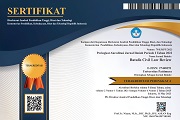The Obligation of The State to Realize Sharia-Compliant Certainty in Islamic Banking Financing
 ), Gusti Wimba Saputra(2)
), Gusti Wimba Saputra(2)
(1) Faculty of Law, Universitas Brawijaya, Malang, Indonesia
(2) Faculty of Syariah, Umm Al-Qura University, Mecca, Saudi Arabia
 Corresponding Author
Corresponding Author
Abstract
Introduction: Islamic banking is growing significantly and rapidly. The state needs its presence not only related to providing the right to freedom of religion but also ensuring that its implementation is following the provisions of sharia. Islamic banks have received a lot of criticism due to the existence of prohibited elements specifically in financing. Therefore, a supervision system for sharia compliance is needed.
Purposes of the Research: This paper analyzes the basis and form of state obligations and their manifestation in ensuring compliance with Sharia principles in Islamic banking financing contracts in Indonesia. Because the State Financial Services Authority as the party with the authority in supervision has not reached the conformity of Sharia principles in the agreement as a private aspect.
Methods of the Research: The problem analysis methodology involves legal research with a philosophical approach. The Statute Approach is conducted by reviewing applicable legal regulations, while the Analytical Approach involves analyzing legal principles and understanding through the examination of legal materials using techniques such as grammatical, teleological, and systematic interpretation.
Results of the Research: The state is responsible for ensuring Sharia compliance in Islamic banking financing stems from the basic principles of Pancasila and the Constitution, as reflected in various laws, regulations, and fatwas of the National Sharia Council. These regulations serve as guidelines for sharia-compliant financing. However, legal certainty is needed in supervision and sanctions in implementing Sharia compliance.Keywords
DOI
10.47268/ballrev.v5i1.1897
Published
2024-03-31
How To Cite
@article{BALLREV1897,
author = {Siti Hamidah and Gusti Saputra},
title = {The Obligation of The State to Realize Sharia-Compliant Certainty in Islamic Banking Financing},
journal = {Batulis Civil Law Review},
volume = {5},
number = {1},
year = {2024},
keywords = {Islamic Banking; State obligation; Sharia Compliance.},
abstract = {Introduction: Islamic banking is growing significantly and rapidly. The state needs its presence not only related to providing the right to freedom of religion but also ensuring that its implementation is following the provisions of sharia. Islamic banks have received a lot of criticism due to the existence of prohibited elements specifically in financing. Therefore, a supervision system for sharia compliance is needed.Purposes of the Research: This paper analyzes the basis and form of state obligations and their manifestation in ensuring compliance with Sharia principles in Islamic banking financing contracts in Indonesia. Because the State Financial Services Authority as the party with the authority in supervision has not reached the conformity of Sharia principles in the agreement as a private aspect.Methods of the Research: The problem analysis methodology involves legal research with a philosophical approach. The Statute Approach is conducted by reviewing applicable legal regulations, while the Analytical Approach involves analyzing legal principles and understanding through the examination of legal materials using techniques such as grammatical, teleological, and systematic interpretation.Results of the Research: The state is responsible for ensuring Sharia compliance in Islamic banking financing stems from the basic principles of Pancasila and the Constitution, as reflected in various laws, regulations, and fatwas of the National Sharia Council. These regulations serve as guidelines for sharia-compliant financing. However, legal certainty is needed in supervision and sanctions in implementing Sharia compliance.},
issn = {2746-8151}, pages = {32--44} doi = {10.47268/ballrev.v5i1.1897},
url = {https://fhukum.unpatti.ac.id/jurnal/ballrev/article/view/1897}
}
Journal Article
Griffiths, John. “What is Legal Pluralism?" *Journal of Legal Pluralism, 24 1986.
Nelly Van Doorn (Harder, Wake Forest University) reviewed R. Michael Feener's book, Muslim Legal Thought in Modern Indonesia, (Cambridge: Cambridge University Press, 2007) in the Journal of American Oriental Society 13, no. 1 (2010): 132-135.
Book
Jimly Asshiddiqie. Konstitusi Ekonomi. Jakarta: Kompas Media Nusantara, 2010.
Muhammad Abdul Mannan, Teori dan Praktek Ekonomi Islam (Dasar-dasar Ekonomi Islam, translated by M. Nastangin from the original title: Islamic Economic: Theory and Practice, Yogjakarta: Dana Bhakti wakaf, 1993.
Muhammad Alim, Asas-azas Hukum Modern dan Pengujian Peraturan Dalam Islam, Public lecture, Faculty of Law, University of Muhammadiyah Yogyakarta, 2002.
Mahfud, Moh. M D. Membangun Politik Hukum, Menegakkan Konstitusi. Jakarta: RajaGrafindo Persada, 2011.
Muhammad Adam HR, Tanggungjawab Negara dalam Menjamin Penerapan Prinsip-prinsip Syariah pada Perbankan Syariah di Indonesia, Dissertation, Doctoral Program in Law, Postgraduate in Law, Sebelas Maret University, Surakarta, 2022.
Rahman, Afzalur. Doktrin Ekonomi Islam Jilid 1, Islamic Economics Series No. 3. License Edition. Yogyakarta: Dana Bhakti Wakaf, 2005.
Rifyal Ka’bah, Penegakan Syariat Islam di Indonesia, Jakarta: Khairul Bayan, 2004.
Soerjono Soekanto and Sri Mamudji, Penelitian Hukum Normatif; Suatu Tinjauan Singkat, Jakarta: Raja Grafindo Persada, 2003.
Tie, Warwick. Legal Pluralism: Toward a Multicultural Conception of Law. Brookfield, VT: Ashgate Publishing Company, 1999.
Thesis, Online/World Wide Web and Others
Armadiy Armawi, Pemikiran Filosofis Hubungan Negara dan Agama di Indonesia, Dissertation summary, Doctoral Program in Philosophy, Postgraduate Faculty of Philosophy, Gadjah Mada University, Yogyakarta, 2009.
CFG Sunaryati Hartono, Upaya Menyusun Hukum Ekonomi Indonesia Pasca 2003," National Development Seminar VIII with the theme "Law Enforcement in the Era of Sustainable Development," organized by the National Law Development Agency of the Ministry of Justice and Human Rights, Denpasar, 14-18 Juli 2003.
Rajagukguk, Erman. Ilmu Hukum Indonesia: Pluralisme. Delivered at a Panel Discussion in the framework of the 37th Anniversary of IAIN Sunan Gunung Djati, Bandung, April 2, 2005.
Syahirul Alim, "Sejarah dan Konsep Pembaruan Hukum Islam Masa Kini di Indonesia. Web Directorate General of Religious Justice Board of the Supreme Court of the Republic of Indonesia.| Dublin Core | PKP Metadata Items | Metadata for this Document | |
| 1. | Title | Title of document | The Obligation of The State to Realize Sharia-Compliant Certainty in Islamic Banking Financing |
| 2. | Creator | Author's name, affiliation, country | Siti Hamidah; Faculty of Law, Universitas Brawijaya, Malang; Indonesia |
| 2. | Creator | Author's name, affiliation, country | Gusti Wimba Saputra; Faculty of Syariah, Umm Al-Qura University, Mecca; Saudi Arabia |
| 3. | Subject | Discipline(s) | |
| 3. | Subject | Keyword(s) | Islamic Banking; State obligation; Sharia Compliance. |
| 4. | Description | Abstract | Introduction: Islamic banking is growing significantly and rapidly. The state needs its presence not only related to providing the right to freedom of religion but also ensuring that its implementation is following the provisions of sharia. Islamic banks have received a lot of criticism due to the existence of prohibited elements specifically in financing. Therefore, a supervision system for sharia compliance is needed.Purposes of the Research: This paper analyzes the basis and form of state obligations and their manifestation in ensuring compliance with Sharia principles in Islamic banking financing contracts in Indonesia. Because the State Financial Services Authority as the party with the authority in supervision has not reached the conformity of Sharia principles in the agreement as a private aspect.Methods of the Research: The problem analysis methodology involves legal research with a philosophical approach. The Statute Approach is conducted by reviewing applicable legal regulations, while the Analytical Approach involves analyzing legal principles and understanding through the examination of legal materials using techniques such as grammatical, teleological, and systematic interpretation.Results of the Research: The state is responsible for ensuring Sharia compliance in Islamic banking financing stems from the basic principles of Pancasila and the Constitution, as reflected in various laws, regulations, and fatwas of the National Sharia Council. These regulations serve as guidelines for sharia-compliant financing. However, legal certainty is needed in supervision and sanctions in implementing Sharia compliance. |
| 5. | Publisher | Organizing agency, location | Faculty of Law, Universitas Pattimura |
| 6. | Contributor | Sponsor(s) | |
| 7. | Date | (YYYY-MM-DD) | 2024-03-31 |
| 8. | Type | Status & genre | Peer-reviewed Article |
| 8. | Type | Type | |
| 9. | Format | File format | |
| 10. | Identifier | Uniform Resource Identifier | https://fhukum.unpatti.ac.id/jurnal/ballrev/article/view/1897 |
| 10. | Identifier | Digital Object Identifier | 10.47268/ballrev.v5i1.1897 |
| 11. | Source | Title; vol., no. (year) | Batulis Civil Law Review; Vol 5, No 1 (2024): VOLUME 5 ISSUE 1, MARCH 2024 |
| 12. | Language | English=en | in |
| 13. | Relation | Supp. Files | |
| 14. | Coverage | Geo-spatial location, chronological period, research sample (gender, age, etc.) | |
| 15. | Rights | Copyright and permissions | Copyright: Authors who publish their manuscripts in this Journal agree to the following conditions: 1. The copyright in each article belongs to the author, as well as the right to patent. 2. Authors are able to enter into separate, additional contractual arrangements for the non-exclusive distribution of the journal's published version of the work (e.g., post it to an institutional repository or publish it in a book), with an acknowledgment of its initial publication in this journal. 3. Authors are permitted and encouraged to post their work online (e.g., in institutional repositories or on their website) prior to and during the submission process, as it can lead to productive exchanges, as well as earlier and greater citation of published work. 4. Authors have the right to self-archiving of the article (Author Self-Archiving Policy)
Licence : Batulis Civil Law Review Journal is disseminated based on the Creative Commons Attribution-NonCommercial 4.0 International license terms. This license allows anyone to copy and redistribute this material in any form or format, compose, modify, and make derivatives of this material for any purpose. You cannot use this material for commercial purposes. You must specify an appropriate name, include a link to the license, and certify that any changes have been made. You can do this in a way that is appropriate, but does not imply that the licensor supports you or your use.
|
Copyright (c) 2024 Siti Hamidah, Gusti Wimba Saputra

This work is licensed under a Creative Commons Attribution-NonCommercial 4.0 International License.

 : 1805 times
: 1805 times Download : 983 times
Download : 983 times














